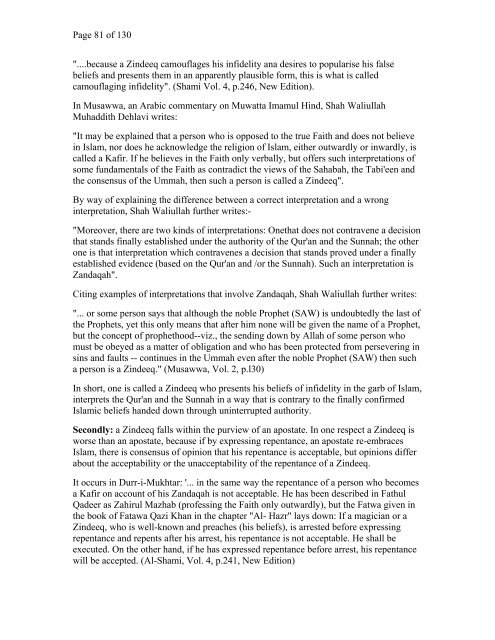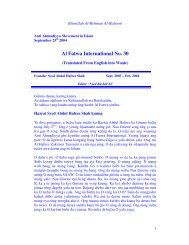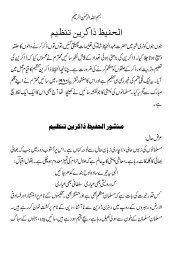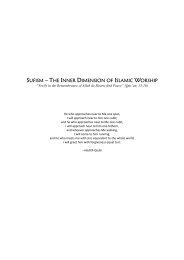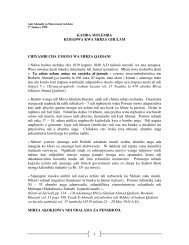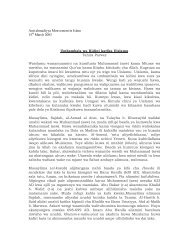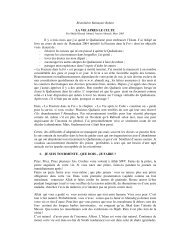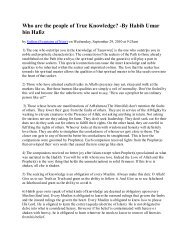Create successful ePaper yourself
Turn your PDF publications into a flip-book with our unique Google optimized e-Paper software.
Page 81 of 130<br />
"....because a Zindeeq camouflages his infidelity ana desires to popularise his false<br />
beliefs and presents them in an app<strong>are</strong>ntly plausible form, this is what is called<br />
camouflaging infidelity". (Shami Vol. 4, p.246, New Edition).<br />
In Musawwa, an Arabic commentary on Muwatta Imamul Hind, Shah Waliullah<br />
Muhaddith Dehlavi writes:<br />
"It may be explained that a person who is opposed to the true Faith and does not believe<br />
in Islam, nor does he acknowledge the religion of Islam, either outwardly or inwardly, is<br />
called a Kafir. If he believes in the Faith only verbally, but offers such interpretations of<br />
some fundamentals of the Faith as contradict the views of the Sahabah, the Tabi'een and<br />
the consensus of the Ummah, then such a person is called a Zindeeq".<br />
By way of explaining the difference between a correct interpretation and a wrong<br />
interpretation, Shah Waliullah further writes:-<br />
"Moreover, there <strong>are</strong> two kinds of interpretations: Onethat does not contravene a decision<br />
that stands finally established under the authority of the Qur'an and the Sunnah; the other<br />
one is that interpretation which contravenes a decision that stands proved under a finally<br />
established evidence (based on the Qur'an and /or the Sunnah). Such an interpretation is<br />
Zandaqah".<br />
Citing examples of interpretations that involve Zandaqah, Shah Waliullah further writes:<br />
"... or some person says that although the noble Prophet (SAW) is undoubtedly the last of<br />
the Prophets, yet this only means that after him none will be given the name of a Prophet,<br />
but the concept of prophethood--viz., the sending down by Allah of some person who<br />
must be obeyed as a matter of obligation and who has been protected from persevering in<br />
sins and faults -- continues in the Ummah even after the noble Prophet (SAW) then such<br />
a person is a Zindeeq." (Musawwa, Vol. 2, p.l30)<br />
In short, one is called a Zindeeq who presents his beliefs of infidelity in the garb of Islam,<br />
interprets the Qur'an and the Sunnah in a way that is contrary to the finally confirmed<br />
Islamic beliefs handed down through uninterrupted authority.<br />
Secondly: a Zindeeq falls within the purview of an apostate. In one respect a Zindeeq is<br />
worse than an apostate, because if by expressing repentance, an apostate re-embraces<br />
Islam, there is consensus of opinion that his repentance is acceptable, but opinions differ<br />
about the acceptability or the unacceptability of the repentance of a Zindeeq.<br />
It occurs in Durr-i-Mukhtar: '... in the same way the repentance of a person who becomes<br />
a Kafir on account of his Zandaqah is not acceptable. He has been described in Fathul<br />
Qadeer as Zahirul Mazhab (professing the Faith only outwardly), but the Fatwa given in<br />
the book of Fatawa Qazi Khan in the chapter "Al- Hazr" lays down: If a magician or a<br />
Zindeeq, who is well-known and preaches (his beliefs), is arrested before expressing<br />
repentance and repents after his arrest, his repentance is not acceptable. He shall be<br />
executed. On the other hand, if he has expressed repentance before arrest, his repentance<br />
will be accepted. (Al-Shami, Vol. 4, p.241, New Edition)


